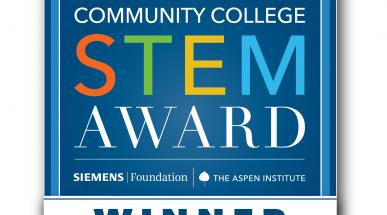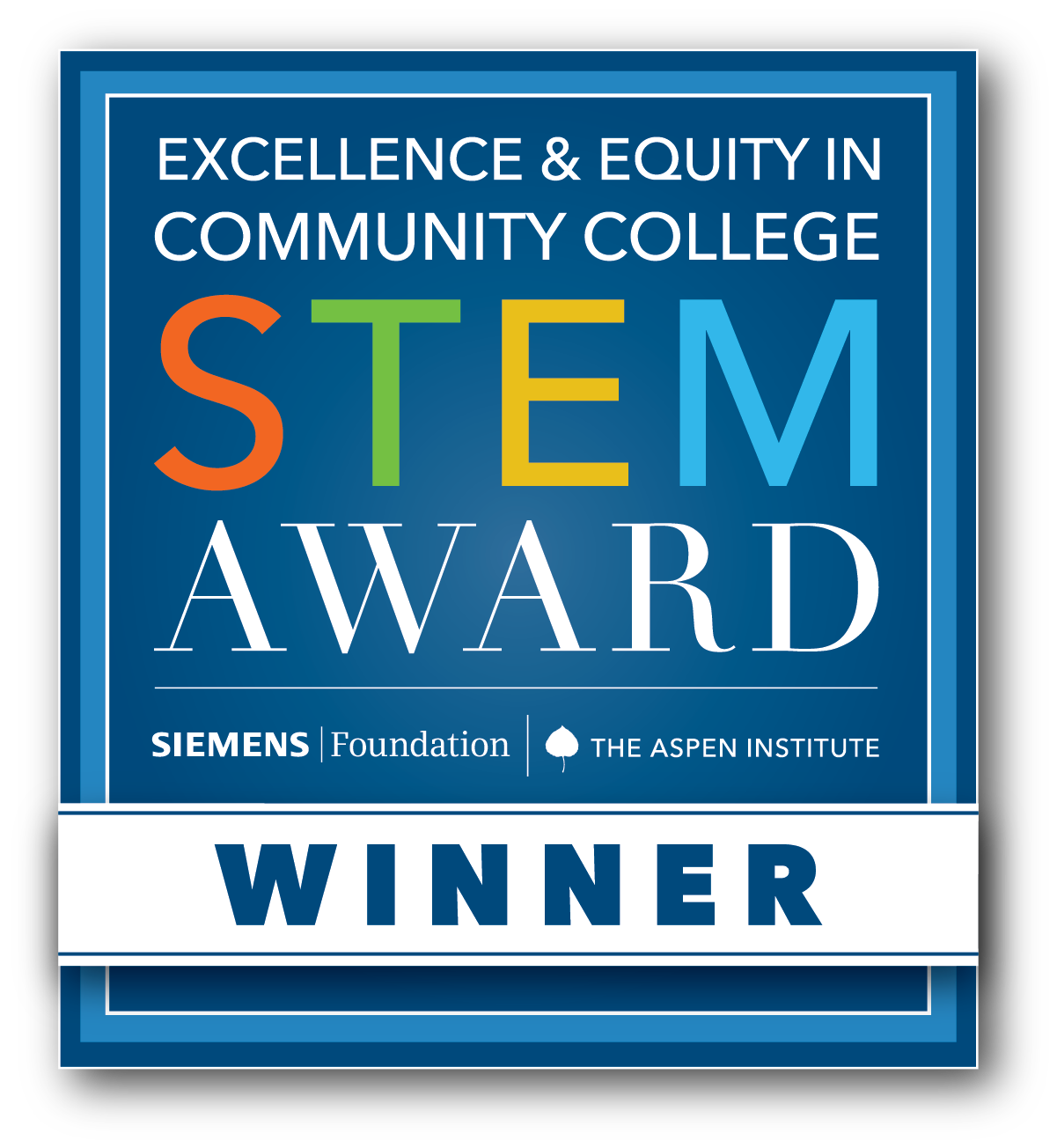San Jacinto College wins national award for outstanding STEM education

College recognized for programs that build career pathways for diverse populations
PASADENA, Texas — The Aspen Institute College Excellence Program and the Siemens Foundation have
awarded San Jacinto College with the Excellence and Equity in Commu nity College STEM Award for the College's associate degree nursing and process technology
programs.
nity College STEM Award for the College's associate degree nursing and process technology
programs.
Eight winning programs from seven community colleges across the country are receiving this award for providing outstanding preparation for high-demand jobs in advanced manufacturing, energy, health care, and information technology. Additionally, these community college programs are also being nationally recognized for their intentional outreach and support of diverse populations that typically are underrepresented in science, technology, engineering, and math careers. San Jacinto College is the only institution to receive the award for two programs.
Each winning program will receive $50,000, with half of the funds allocated for program development and the other half allocated as scholarships for outstanding students, known as Siemens Technical Scholars.
"San Jacinto College utilizes a holistic approach for equity in access and success to ensure that all students have an opportunity to earn a higher education credential," said Chancellor Dr. Brenda Hellyer. "We are incredibly grateful to the Aspen Institute and the Siemens Foundation for this award and for recognizing San Jacinto College faculty and staff for the important work they do every day to ensure our students succeed."
RN-to-BSN pathway
For more than 50 years, the College's associate degree nursing program has been vital to the Gulf Coast health care workforce.
Approved by the Texas Board of Nursing with national accreditation through the Accreditation Commission for Education in Nursing, the College's nursing program has provided a successful pathway for students beginning with the certified nurse aide, licensed vocational nursing, licensed vocational nursing to registered nurse, and the associate degree nursing programs. Graduates from the RN program who successfully complete the NCLEX-RN exam are then qualified to practice as professional registered nurses. Entry-level wages for registered nurses in the Gulf Coast region in 2018 were $63,107, whereas experienced registered nurses averaged $88,313.
In 2010, a report by the Institute of Medicine called for hospitals to have 100% of nursing managers and 80% of all registered nurses to have a Bachelor of Science in Nursing by 2020 to keep up with the evolving health care industry. These increased credentials would also help hospitals achieve magnet status, a highly-sought ranking among medical institutions.
San Jacinto College responded and began developing its RN-to-BSN program. Chancellor Dr. Brenda Hellyer and other College administrators and faculty formed a BSN implementation team and invited local hospital partners to participate in developing proposals, curriculum, program outcomes, and the approval process of its new BSN program. In 2017, the 85th Texas Legislative Session authorized certain community colleges to offer BSN programs, and the following year, San Jacinto College received approval from the Texas Higher Education Coordinating Board to proceed with the final stages of BSN program development.
Tailored to the working RN, the BSN program will include small class sizes, focus on face-to-face and online learning opportunities, and have the same flat tuition costs as general education courses. BSN students will also have the same financial aid and educational resources as traditional students. The San Jacinto College BSN program began classes with its inaugural cohort in fall 2020.
Process technology program
Located in the heart of the Texas Gulf Coast petrochemical manufacturing region with 123 refineries and petrochemical plants located within a 13-mile radius, San Jacinto College is the industry's primary workforce education partner.
The College's process technology program is the largest of its workforce training programs. With the recent addition of the LyondellBasell Center for Petrochemical, Energy & Technology at its Central Campus, students entering the petrochemical manufacturing and energy workforce are receiving hand-on, real world, dynamic training like never before.
The Associate of Applied Science in process technology program prepares students to become plant operators responsible for equipment, hazards produced by chemicals, and the applicable chemistry and physics involved in process technology. Students learn to read piping and instrumentation diagrams, identify and troubleshoot equipment, operate simulators, and run the glycol distillation unit. Graduates find employment in chemical plants, refineries, wastewater treatment plants, pharmaceutical plants, canneries, and more, with entry-level operators averaging $60,000 annually.
Within the last eight years, there have been more than $60 billion in new capital investments in the Houston Port region. These investments in plant expansions combined with the realities of a retiring workforce, demand for diversity, and new technology have generated a strong labor demand for new employees.
To address these workforce needs, the process technology program has increased outreach efforts to high school students and college-age Hispanic and African American students. Each year in partnership with the Economic Alliance-Houston Port Region and the East Harris County Manufacturing Association, the program reaches more than 1,000 high school students through CPET facility tours, career fairs, technology showcases, and campus STEM events.
The College's partnership with EHCMA has also resulted in more than $500,000 in scholarships for students in petrochemical and industrial trade programs, the majority of which have supported process technology students.
The program also continues to grow its female student enrollment, currently at 11% of its 25% goal. Two annual outreach events for women are the Women in Industry and Date with Destiny student conferences. These conferences focus on women in petrochemical and industrial construction. These conferences provide female students with access to networking opportunities within the industry and expose them to potential future job opportunities.
Filling the workforce pipeline
Overall, U.S. jobs in STEM fields are projected to grow at almost double the rate of non-STEM occupations. More than half of all STEM jobs across the U.S. require only an associate degree and pay wages that average more than $50,000 annually.
The community colleges honored with the Excellence and Equity in Community College STEM Award are playing a unique role in working to meet this demand. The selection committee identified exemplary programs that deliver exceptional training for jobs that require strong STEM technical skills, some classroom hands-on training, and a postsecondary credential below a four-year degree. These programs also demonstrated an emphasis in successfully reaching and supporting populations that are underrepresented in STEM fields, such as students of color, low-income students, and females.
"Community college STEM programs are a strong pathway to job security and financial success for many students, whether that means heading right into a great-paying job or getting a more advanced degree," said David Etzwiler, CEO of the Siemens Foundation. "This award recognizes the colleges that provide an excellent STEM education and develop talent from every community."
As part of the award, San Jacinto College, in partnership with the Aspen Institute, will select students to be recognized as Siemens Technical Scholars and receive a scholarship of $3,500 to $10,000 to continue their education or pay student loan debt. These diverse scholars will share their stories with their peers to demonstrate the economic opportunity available in STEM careers.
About the Aspen Institute College Excellence Program
The Aspen Institute College Excellence Program aims to advance higher education practices, policies, and leadership that significantly improve student outcomes. The program is part of the Aspen Institute, a global nonprofit organization committed to realizing a free, just, and equitable society.
About the Siemens Foundation
The Siemens Foundation has invested more than $122 million in the U.S. to advance workforce development and education initiatives in science, technology, engineering, and math. The Siemens Foundation's mission is inspired by the culture of innovation, research, and continuous learning that is the hallmark of Siemens' companies. Together, the programs at the Siemens Foundation are closing the opportunity gap for young people in the U.S. and igniting and sustaining today's STEM workforce and tomorrow's scientists and engineers. For further information, visit siemens-foundation.org or follow @sfoundation on Twitter.
About San Jacinto College
Surrounded by monuments of history, evolving industries, maritime enterprises of today, and the space age of tomorrow, San Jacinto College has served the citizens of East Harris County, Texas, since 1961. San Jacinto College is among the top 10 community colleges in the nation as designated by the Aspen Institute for Community College Excellence, and was named an Achieving the Dream Leader College of Distinction in 2020. The College serves approximately 45,000 credit and non-credit students annually, and offers more than 200 degrees and certificates across eight major areas of study that put students on a path to transfer to four-year institutions or enter the workforce. San Jacinto College's impact on the region totals $1.3 billion in added income, which supports 13,044 jobs. The College is fiscally sound, holding bond ratings of AA and Aa2 by Standard & Poor's and Moody's.
For more information about San Jacinto College call 281-998-6150, visit sanjac.edu or join the conversation on Facebook and Twitter.
